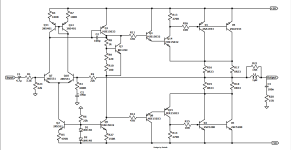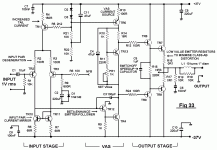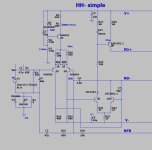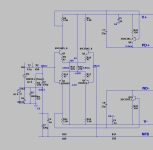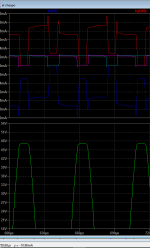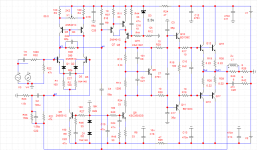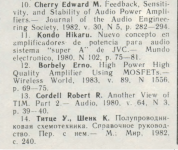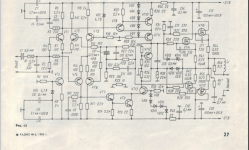Looks pretty decent - I can suggest some improvements though.
Those MJE15033's are too hefty for a VAS, lots of capacitance and too little gain. I'd suggest emitter-degeneration resistors on the differential pair, emitter-follower VAS using low capacitance transistors (KSA992 + 2N5401 perhaps). You want a VAS Cbc to be a lot less than the Miller cap in a single transistor VAS - the emitter-follower VAS really helps here as transistor requirements are less severe.
The Zobel network should be on the amp output direct normally, not the other side of the inductor.
For the low current devices KSC1845/KSA992's might be a better choice, lower noise and higher gain.
The input network needs RF suppressing caps or RF-breakthrough may be quite bad. In the old days taxis were the problem, today its mobile phones and WiFi.
The 3k3 on the input is adding noise, C1 needs something like a 100k bleeder resistor on the input side so it doesn't hold charge when nothing's plugged in (that leads to bangs when you finally do plug something in!).
Those MJE15033's are too hefty for a VAS, lots of capacitance and too little gain. I'd suggest emitter-degeneration resistors on the differential pair, emitter-follower VAS using low capacitance transistors (KSA992 + 2N5401 perhaps). You want a VAS Cbc to be a lot less than the Miller cap in a single transistor VAS - the emitter-follower VAS really helps here as transistor requirements are less severe.
The Zobel network should be on the amp output direct normally, not the other side of the inductor.
For the low current devices KSC1845/KSA992's might be a better choice, lower noise and higher gain.
The input network needs RF suppressing caps or RF-breakthrough may be quite bad. In the old days taxis were the problem, today its mobile phones and WiFi.
The 3k3 on the input is adding noise, C1 needs something like a 100k bleeder resistor on the input side so it doesn't hold charge when nothing's plugged in (that leads to bangs when you finally do plug something in!).
There are no resistors in the emitters of the differential cascade , there are no protective diodes at the inputs . The correction of the amplifier is not optimal . The choice of the output stage is not optimal.
*Q4Q6 in current starvation mode,
*the Thiel coil L1R21 will not cope with protecting the negative feedback circuit with a capacitive load of approximately more than 0.5 μF - this is very small.
Q4/14 darlington CFP stage will oscillate (Mhz+) . Won't be able to set a stable bias and the thing will get hot !
All like this topology are derived from the newer '72 "LIN" or Doug Self's books. -link --- http://www.douglas-self.com/ampins/dipa/dipa.htm
One of the most "linked to" designs. I built it first 20 years ago ...... an easy and forgiving design.
In the link he shows example of a CFP . I tend to stick to EF2/EF3 (more stable) , less dependent on layout.
(below is EF2 version ).
OS
All like this topology are derived from the newer '72 "LIN" or Doug Self's books. -link --- http://www.douglas-self.com/ampins/dipa/dipa.htm
One of the most "linked to" designs. I built it first 20 years ago ...... an easy and forgiving design.
In the link he shows example of a CFP . I tend to stick to EF2/EF3 (more stable) , less dependent on layout.
(below is EF2 version ).
OS
Attachments
Then , there are the other two super simple type designs.
Everyone seems to go OCD on the blameless (self).
1- HH (hitachi) type design. I can pop one of these on a protoboard in 10 minutes - always works.
2 - then the Symmetrical type (Leach amp). You will find these in cheap subwoofer AB amp plates.
Parts - express older sub plates are this design.
Add either of these to a standard Vbe - EF2 , and you will be jammin' in no time ! 🙂🙂
OS
Everyone seems to go OCD on the blameless (self).
1- HH (hitachi) type design. I can pop one of these on a protoboard in 10 minutes - always works.
2 - then the Symmetrical type (Leach amp). You will find these in cheap subwoofer AB amp plates.
Parts - express older sub plates are this design.
Add either of these to a standard Vbe - EF2 , and you will be jammin' in no time ! 🙂🙂
OS
Attachments
Here's one (below) -
-NOT A BLAMELESS !!
OS
- VAS no saturation , clips 3+V before output does. Can't fry it !!
- R6/R12 can be 500R trimmers - adjust any offset or global VAS current.
- Thermals are slightly negative (LED + BJT) .1mA less VAS Ic at high temp. Vbe can be "flat line".
- .005% @ 20khz /ppm @ 1k
- simple with pretty red led's... "Anal stability" , even with 22pF miller compensation.
-NOT A BLAMELESS !!
OS
Attachments
Cascoded "Blameless" - ooohh .... with a "superpair" VAS beta helper.
Lots of OLG (loop gain") , but not "anal stability" (C20/23/27). yikes ... AND C16....
Bet the simple "el cheapo" symmetrical with an EF3 (triple) would match it's THD.
OS
Lots of OLG (loop gain") , but not "anal stability" (C20/23/27). yikes ... AND C16....
Bet the simple "el cheapo" symmetrical with an EF3 (triple) would match it's THD.
OS
https://archive.radio.ru/web/1985/05/041/
https://archive.radio.ru/web/1985/06/028/
The frequency-dependent integrating nested OOS is chosen to preserve the overall loop gain.
https://archive.radio.ru/web/1985/06/028/
The frequency-dependent integrating nested OOS is chosen to preserve the overall loop gain.
Attachments
Last edited:
- Home
- Amplifiers
- Solid State
- Simple hifi amp
